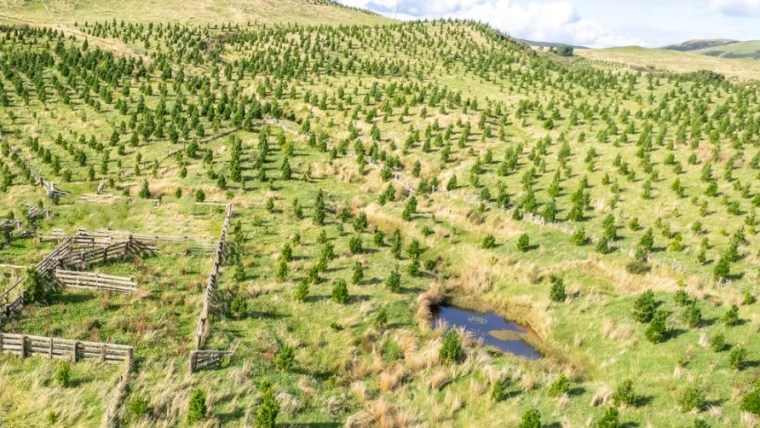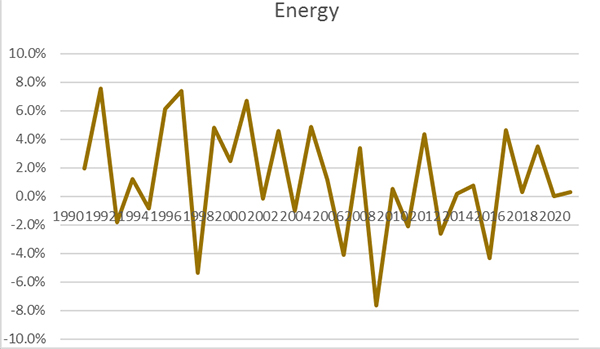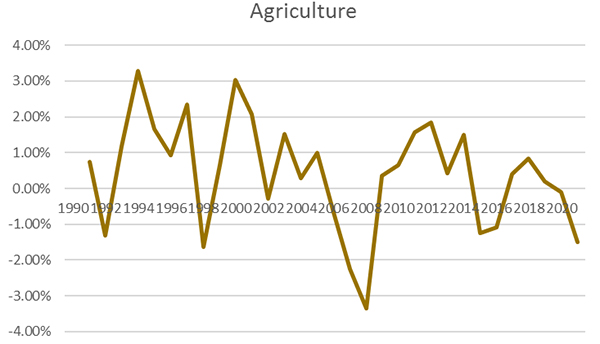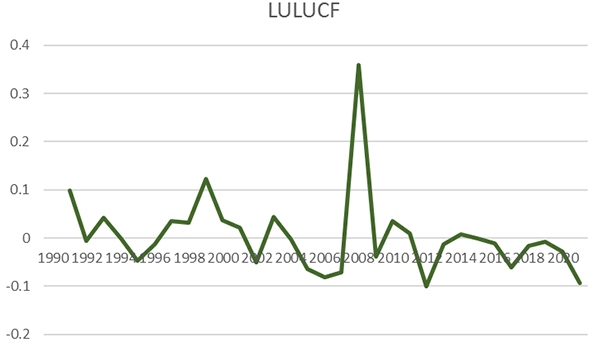
The Ministry for the Environment (MFE) have recently released the latest update of New Zealand’s GHG emissions. Given the time lag in reporting, this is for the 2021 period, and the proximity to the Covid lock downs the ‘recent’ years results are perhaps less meaningful than they have been in the past.
However, overall, since 2020 there has been a 0.7% reduction in gross emissions to 76.8 mtns. This drop is largely attributed to the agricultural sector.
Since 1990 when the record keeping began in earnest there have been several years when negative comparisons have occurred although it could be argued that this time the drop is more greatly due to government policies and farmers attempt to reduce GHG’s. Even the MFE agree that Covid would have had little reducing impact upon agriculture, in fact given the delays that have been occurring getting livestock to processors the reverse could be argued although the amounts would be at the fringes of the reporting scale.
The reductions in nitrogen fertiliser inputs are one area where reductions can be shown and livestock numbers another.
In the past the falls seem largely due to droughts, and occurrences such as the financial crisis of 2008. Of course future occurrences may also show this surmising to be totally wrong, however, we shall see.
Unfortunately, before the ag sector can start any collective back slapping, since 1990, when we were meant to be starting to reduce GHG outputs the sector GHG gross outputs have increased by around 13%. Ironically given the discussions around carbon farming, nationally, net emissions (i.e. after Land Use Change etc) have actually increased in the 12 months post 2020 by 3% and this is largely due to the attributed reductions in removals by forestry. This is likely to reverse in upcoming years which with continuing declines from agriculture should mean that we can look forward to locking in future reductions, at least from the land-based sectors.
Perhaps of interest is with dairy, despite having year on year reductions in total cow numbers (4.99m in 2017/18 to 4.90 in 2020/21) along with a comparable number of herd reductions the actual average number of cows farmed per hectare has increased slightly (2.84 per ha to 2.86). Given reductions in nitrogen over this period the reduction in cows but slightly increased stocking rate means that the farms that are leaving dairying are likely on less productive land rather than the remaining farmers lifting stocking rates. Sheep numbers also have declined over this period.
Despite the gains being made in agriculture (be them modest) there is still yet to be any sign of the same trends occurring in the energy sector (Transport and fossil fuelled energy). Since 1990 energy has increased by approximately 30% and if ‘we’ take out the covid effect of 2020 it further increases to approximately 37%.
Given the lack of focus applied by governments (and oppositions) to this sector (which does happen to include all of us) it does make criticisms of agriculture attempts to reduce outputs look all the more cynical, especially given the impact upon GDP that agriculture contributes.
The LULUCF sector keeps track of greenhouse gases from land use such as forests, crops and pasture and changes in use and so an argument can be made that an inclusion of LULUFC with agriculture makes sense. In the meantime the gap between energy and agriculture is closing and back in 1990 energy had 14.6% of the gross GHG’s emissions when compared to agriculture it now has only 8.6% difference and the rate is likely to close as agriculture continues to reduce and there is little sign of such moves occurring in energy in the short(ish) term.
Percent of National Gross GHG emissions
| 1990 | 2021 | |
| Energy | 36.9% | 40.6% |
| Agriculture | 51.5% | 49.2% |
Source: Data from MFE
There are increasing criticisms of tree plantings being allowed to be used as off sets especially when they are used to offset fossil fuel use as they are disguising the ‘real’ rate of emissions. In addition if future GHG emissions require overseas off sets then there is plenty of evidence that the money flows go from the least corrupt nations to some of the worst. Given some have said that it could cost upwards of $12billion annually to achieve our committed Paris Agreement goals. The lack of attention to energy appears to continue to be the elephant in the corner. Agricultures gains have been modest but at least there is a forward-looking plan, the latest data (be it 18 months old) continues to show how little has been done to arrest energy emissions.
The graphs below are created using MFE data showing the difference in emissions from the previous year and highlight some of the occurrences that have influenced emissions in the different sectors.
The financial crisis in 2008 had a major influence in reducing emissions and increasing LUULCF, perhaps less demand for trees then so less harvested and more sequestration. It also coincided with a very dry year on the back of 2007 which was also dry. My expectation is that we can expect to see LULUCF turn up in the next few reporting periods and agriculture likely continue down and little change to energy in the meantime



19 Comments
Is anything being done to reduce emissions from the transport industry? Seems that business interests are being put ahead of commonsense approaches.
Even in the most simplistic example, our homes, transport has become so much less efficient. Everything has become so much more tailored to the individual and thus individual preference rather than efficiency as the primary driver.
Our need for goods delivered to our door next day means that rather than seeing a single postie visiting a street once a day, as happened not that long ago, we now have four different courier companies travelling down our road, often twice a day. Likewise rubbish collection is just as mad, rubbish day multiple companies send big trucks down the road to collect a small percentage of the bags/bins. Extrapolate these micro level examples out and I’m sure we have some major issues at all levels of the transport industry.
We have numerous emissions schemes, effective or not, imposed on agriculture surely someone is looking at the logistics of transport nationwide. Surely with so many ports and rail networks we could design things in a more efficient manner, then develop policies that encourage those efficient forms of transport rather than the free for all we have now.
The market will fix all of this LOL.
Guy, forestry will not even offset its harvest removals. The country has had the benefit of these forests since 1990s and you can't double count. It will take 10 to 15 years before these harvested forests start to recontribute - way to late to help the 2030 target. The new ones being planted won't kick in for 5 to 6 years. Native won't do anything for 15 to 30 years and even then very slow and very low numbers.
People do not understand forests and how they function. They simply buy some time to change meanwhile, as the numbers show, it's BAU with everyone having an excuse to not change.
Me and my forest ecology friends have given up and decided most NZers can't read more than a headline by an I Reckon expert and definitely can't add or subtract simple numbers.
No exotic forest plus no change - be prepared to pay a lot more. Farmers use fossil fuels as well I think so costs go up up up.
And the easiest way to cut ag emissions?
Push up FF prices, but that of course is to hard and affects urban BAU.
Something's gonna break.
100% correct - The Crux of the problem- no one wants to change THEIR LIFESTYLE and have copious reasons why not and if you do I'll not vote for you.
You don't need to do anything to reduce ag emissions farmers - there are already very strong incentives without a carbon bludging scam for the big end of town. 450,000 tonnes of red meat from 25 million sheep today vs. 600,000 tones of meat from 70 million back in the Muldoon SMP days. Likewise forestry stands on it's own two feet - yet now we have mature pruned stands being locked up for carbon lucre that don't change the climate and push up the price of local timber making imported Chinese steel more attractive.
Oh well, it is hard to decrease emissions, when working so hard to increase them!
https://www.interest.co.nz/business/120747/more-20000-people-arrived-ne…
Haha yeah fly in a ton of low skilled people to buy cheap petrol cars and live in cheap badly insulated ŕentals.. build a ton of cheap infrastructure for them to use and see what happens.
Not to mentiin flooding nz with cheap money for years on end most of which went to people to buy Utes with massive engines and oversized houses.
Genius strategy.
You never here the Greens complaining about aircraft emissions!!
Why? Because they need planes to fly to endless meaningless COP junkets
Then there are the 60,000 commercial ships that sail the ocean delivering plastic!!!!. Not ama peek from the "eco kid" protesters!
Why? Because they need their new i phones, cuddly " security" toys etc...
Then there is the biggest polluter of all... Woman!!! ...
Yip, woman's, cosmetic, jewelry and accessories industries and it's associated plastic packaging waste never never get a " hairy eyeball" from Greta Thunberg and her mates!
Yip!!! The womans fashion / makeup industry creates more pollution of the oceans than 1,000 Exxon Valdez oil spills annually!
Who'd a thought all those little bottles of lippy, nail polish, eyeliner, fake eyelashes, handbags, FMB's, .. would be sooooo bad.!?!?
so next time you see a rabid young protester screaming at you about your V8 commodore just flick them the Bird 🖕and point at their makeup!
What happened in 2016 to cause a downturn, and how can we recreate this. How do droughts affect energy output, can someone explain this? As I read somewhere we tend to use more sustainable sources of energy i.e hydro, in rainy years such as the one just been.
Great article, Guy.
New Zealand to Tax Agriculture Emissions at the Farm in World First
Our fixation with respect to agricultural emissions is as bad as our approach to coastal science/policy. The bureaucrats (and their consultants) are busily forecasting and calculating the effects of SLR out to 100 years, meanwhile slips and inland flooding is taking out built infrastructure all around them.
We need to start acting for the good of the nation - not for the good of the UNFCCC.
It was always the wrong framework for us - here's the right one.
Sounds like you deliberately ignore the scientific fact that Ag contributes a huge amount to our GHG footprint for a low value export commodity ( milk powder).
It's also a sector where reductions are relatively easy to make as Guy's article highlights in the first paragraphs.
How about we move on from the same old tired path and start rebuilding our Ag sector and the whole economy towards lower emissions?
For Ag this certainly means a shift from methane belching livestock to growing more crops and shifting from low value milk powder to higher value products that are produced locally.
For the wider economy, we need to invest more into education and tech as these bring high returns with much lower emissions.
Not ignoring that at all. What I'm pointing out is another fact - no other nation in the world has an emissions profile like ours where a food producing activity represents roughly half our of emission profile.
And methane emissions for that roughly half of our emission profile are not increasing in the way that energy-use activities have been since the 1990 baseline.
The UNFCCC framework itself makes the distinction and recognises the importance of food production activities.
If there are to be emission reductions in that sector, then the target should be focused on the processing not the growing activities. The focus of action regarding pollution for farming should be on water quality improvements. With that will come methane emissions reductions. No punitive taxation measures needed.
Easy to say, but unfortunately if you look into the science of our land, whats in the soil and what can be best produced. The answer is rather surprisingly, GRASS. So please look at the science first. Then factual informed decisions can be made. There have been a number of articles on Interest.co.nz on this very subject, I am sure someone will be able to locate them
That's right QuickFox, our soils are heavily reliant on fertilizer inputs to grow anything. The other issue is very little tractor country.
Most of NZ is only good for grazing livestock or forestry.
No doubt , grass is the easiest thing to grow in NZ.
However , i would dispute the idea that therefore it should be the only thing grown .
Soil can be changed , its just the inputs been put on are for the fastest production of grass , with no attempt to build soil structure or carbon etc .
this is what the regenerative people are on about. of the organics farmers have known this for nearly a century , most organic farms are low input fr maybe 10 -20 % less output.
No one said it is / will be easy, I've dabbled for years , but you need to be 100 % committed to get results. As with any farming , you don't spray weeds once and forget about them , with organics its more long term, and not necessarrily thinking all weeds are bad in the first place.
I had my first go at making biochar , you need a shitload of wood to produce a relatively small amount of biochar , though i suspect i had to much oxygen , and therefore too much flame getting in . you also need a lot of water to put it out . Then the calves got in and had a play in it ....
Make no mistake, there is no backslapping until we reach net carbon neutral globally.
Anything else just continues the self-destructive path a teensy bit slower as we are still heating the planet!!!
Lets face it, neither Labour nor National are going to upset their mates in big business, so they are very unlikely to make a move on energy emissions, I include ACT and NZ First in this group as well.
Greens are going to continue to go after the farmers, so they won't as well.
So who has the best policies left. TOP need to come out with their strategy, I like the sound of the Teal Card, to get more use out of public transport.
But more needs to be done. New York have a law that delivery trucks can not leave the trucks running while doing deliveries. This would be a start. Smaller delivery trucks should be electric.
Any other ideas???
The Greens are not out to get Farmers, not real ones anyway .
To your 2nd point , more should be done to ensure a limited supply of electric vehicles are going into areas of maximum usage . too many Teslas etc sitting in the driveway most of the day , not really saving much as a nation. Couriers and taxis are the obvious high use where electric would save a lot .

We welcome your comments below. If you are not already registered, please register to comment
Remember we welcome robust, respectful and insightful debate. We don't welcome abusive or defamatory comments and will de-register those repeatedly making such comments. Our current comment policy is here.